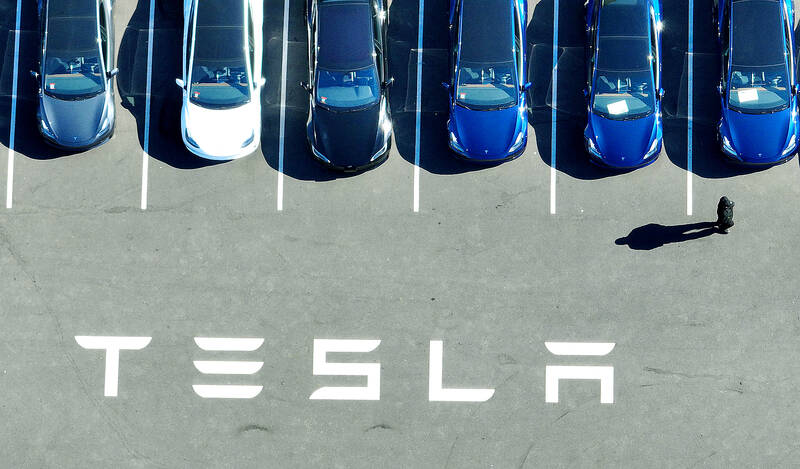Tesla Inc yesterday announced price cuts for its electric vehicles in Taiwan, following recent markdowns in China, Japan, South Korea, Australia and the US to boost buying interest amid weakening global demand.
The Model Y Performance edition, one of its best-selling vehicles in Taiwan, saw the steepest price cut of NT$220,000 (US$7,402) to about NT$2.38 million, information on Tesla’s Web site showed.
The price of the Model Y Long Range version has been lowered by NT$180,000 to about NT$2.12 million, it said.

Photo: AFP
As for its Model 3 series, the price of the RWD version has been cut by NT$60,000 to about NT$1.7 million, while the prices of the Model 3 Long Range version and the Performance version were lowered by NT$149,100 and NT$200,000 to about NT$2.08 million and NT$2.27 million respectively.
The US company said the price cuts would apply to vehicles that have not yet been delivered to buyers.
On Jan. 6, Tesla announced price cuts for its models on sale in China, the second markdown in three months, but the company did not take similar action in Taiwan before the Lunar New Year holiday, which ended on Sunday.
Tesla is the favorite electric-vehicle brand in Taiwan. In the fourth quarter of last year, the company sold more than 4,500 units in the Taiwanese market, marking a new quarterly sales record for any electric vehicle brand in the local market.
Last year, Tesla posted a 95 percent year-on-year increase in sales in Taiwan to more than 11,000 units.

‘SWASTICAR’: Tesla CEO Elon Musk’s close association with Donald Trump has prompted opponents to brand him a ‘Nazi’ and resulted in a dramatic drop in sales Demonstrators descended on Tesla Inc dealerships across the US, and in Europe and Canada on Saturday to protest company chief Elon Musk, who has amassed extraordinary power as a top adviser to US President Donald Trump. Waving signs with messages such as “Musk is stealing our money” and “Reclaim our country,” the protests largely took place peacefully following fiery episodes of vandalism on Tesla vehicles, dealerships and other facilities in recent weeks that US officials have denounced as terrorism. Hundreds rallied on Saturday outside the Tesla dealership in Manhattan. Some blasted Musk, the world’s richest man, while others demanded the shuttering of his

ADVERSARIES: The new list includes 11 entities in China and one in Taiwan, which is a local branch of Chinese cloud computing firm Inspur Group The US added dozens of entities to a trade blacklist on Tuesday, the US Department of Commerce said, in part to disrupt Beijing’s artificial intelligence (AI) and advanced computing capabilities. The action affects 80 entities from countries including China, the United Arab Emirates and Iran, with the commerce department citing their “activities contrary to US national security and foreign policy.” Those added to the “entity list” are restricted from obtaining US items and technologies without government authorization. “We will not allow adversaries to exploit American technology to bolster their own militaries and threaten American lives,” US Secretary of Commerce Howard Lutnick said. The entities

Minister of Finance Chuang Tsui-yun (莊翠雲) yesterday told lawmakers that she “would not speculate,” but a “response plan” has been prepared in case Taiwan is targeted by US President Donald Trump’s reciprocal tariffs, which are to be announced on Wednesday next week. The Trump administration, including US Secretary of the Treasury Scott Bessent, has said that much of the proposed reciprocal tariffs would focus on the 15 countries that have the highest trade surpluses with the US. Bessent has referred to those countries as the “dirty 15,” but has not named them. Last year, Taiwan’s US$73.9 billion trade surplus with the US

Prices of gasoline and diesel products at domestic gas stations are to fall NT$0.2 and NT$0.1 per liter respectively this week, even though international crude oil prices rose last week, CPC Corp, Taiwan (台灣中油) and Formosa Petrochemical Corp (台塑石化) said yesterday. International crude oil prices continued rising last week, as the US Energy Information Administration reported a larger-than-expected drop in US commercial crude oil inventories, CPC said in a statement. Based on the company’s floating oil price formula, the cost of crude oil rose 2.38 percent last week from a week earlier, it said. News that US President Donald Trump plans a “secondary